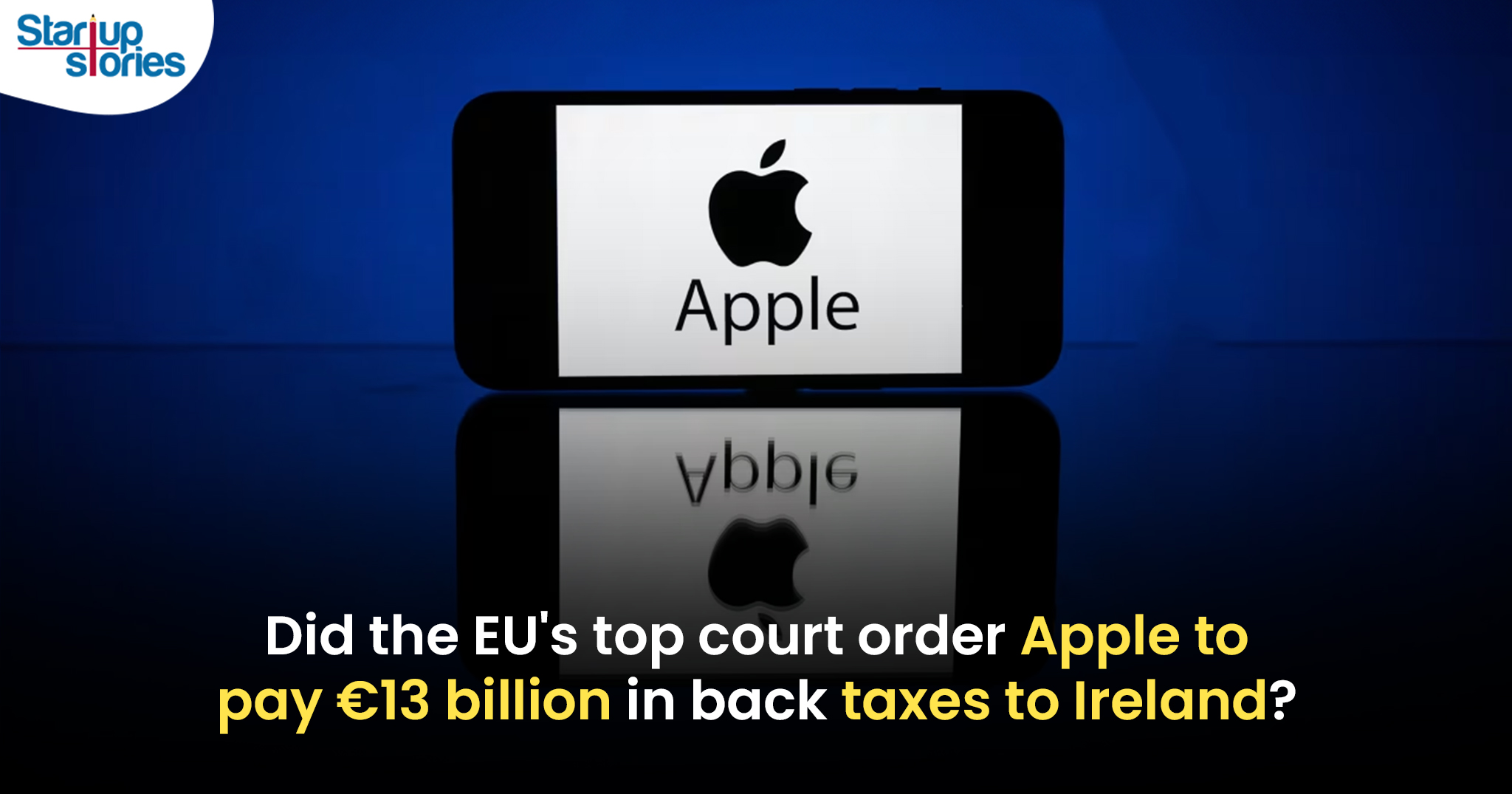Latest News
Apple Ordered to Pay €13 Billion in Back Taxes to Ireland by EU’s Top Court!

In a significant ruling, the European Court of Justice (ECJ) has ordered Apple to repay €13 billion ($14 billion) in back taxes to Ireland, affirming a 2016 European Commission decision that Apple received illegal state aid from the Irish government. This ruling concludes a lengthy legal battle that began in 2014 when the Commission initiated an investigation into Apple’s tax practices in Ireland, where the company has its European headquarters.
Background of the Case
The European Commission’s investigation revealed that Apple benefited from two tax rulings in 1991 and 2007, which allowed the company to significantly reduce its effective tax rate in Ireland—from 1% in 2003 to just 0.005% in 2014. The Commission determined that these arrangements constituted unlawful state aid, prompting it to instruct Ireland to recover the unpaid taxes from Apple.
Legal Proceedings
Initially, in 2020, the EU General Court sided with Apple, overturning the Commission’s ruling by stating that it had not adequately proven that Apple received a selective tax advantage. However, the Commission appealed this decision, leading to the recent ECJ ruling that reinstated the original order for Apple to repay the taxes.
Apple’s Response
In response to the ruling, Apple expressed disappointment, asserting that it has always paid the taxes owed in accordance with international law and that the income in question had already been taxed in the U.S. The company maintained that the case was not about the amount of tax owed but rather about which government had the right to collect it. Apple emphasized its role as a significant taxpayer and contributor to economic growth in Europe.
Implications for Ireland and the EU
This ruling is seen as a setback for Ireland, which has positioned itself as a favorable location for multinational corporations due to its low corporate tax rates. The Irish government has contested the need for Apple to repay these taxes, arguing that such arrangements are essential for attracting foreign investment. The ECJ’s decision, however, reinforces the European Commission’s efforts to eliminate preferential tax deals that give certain companies an unfair advantage over others in the EU market.
Conclusion
The ECJ’s ruling not only marks a pivotal moment in Apple’s tax saga but also serves as a critical victory for the European Commission in its ongoing campaign against tax avoidance by multinational corporations. As the legal landscape continues to evolve, this case underscores the tensions between U.S. tech giants and European regulatory frameworks regarding taxation and competition.
Latest News
D2C Brand Neeman’s Raises $4 Million for Tier 2/3 Store Expansion & Eco-Friendly Shoes

Hyderabad, January 13, 2026 Neeman’s, India’s leading D2C footwear brand famed for sustainable shoes and patented PIXLL® technology, has raised $4 million from existing investors. This funding boosts its cumulative capital past $10 million since 2015, with a post-money valuation nearing $50 million. CEO Vijay Chahoria emphasized offline retail as the “next frontier,” planning 50+ new stores in Tier 2/3 cities like Jaipur and Lucknow to blend eco-friendly innovation with hands-on customer experiences.
In India’s booming D2C ecosystem where footwear sales hit ₹1.2 lakh crore in 2025 Neeman’s targets hybrid retail amid high online CAC and 25-30% returns. Backed by vegan, machine-washable shoes priced ₹2,000-4,000, the brand leverages PIXLL® (5x more breathable than leather) for carbon-neutral comfort. Recent 5x revenue growth to ₹100 crore ARR, 1M+ pairs sold via Myntra and stores, and awards at India D2C Summit 2025 position it ahead of rivals like Paaduks.
Neeman’s offline expansion India eyes the $15B sustainable footwear market by 2028, fueled by PLI schemes, Gen Z’s 70% eco-preference (Nielsen), and Southeast Asia exports. Challenges like real estate costs are offset by data-driven inventory and omnichannel QR tech. Watch for Q1 2026 launches in Hyderabad and Bengaluru redefining D2C success through authentic, “Wear the Change” branding.
Latest News
Centre Mulls Revoking X’s Safe Harbour Over Grok Misuse

The Centre is weighing the option of revoking X’s safe harbour status in India after its AI chatbot Grok was allegedly misused to generate and circulate obscene and sexually explicit content, including material seemingly involving minors. The IT Ministry has already issued a notice to X, directing the platform to remove unlawful content, fix Grok’s safeguards, act against violators, and submit a detailed compliance report within a tight deadline. If the government finds X’s response inadequate, it could argue that the platform has failed to meet due‑diligence standards under Indian law, opening the door to harsher action.
Under Section 79 of the IT Act, safe harbour protects intermediaries like X from being held directly liable for user‑generated content, provided they follow due‑diligence rules and promptly act on legal takedown orders. Revoking this protection would mean X and its officers could be exposed to criminal and civil liability for obscene, unlawful, or harmful content that remains on the platform, including AI‑generated images from Grok. This prospect significantly raises X’s compliance risk in India and could force tighter moderation, stricter AI controls, and more aggressive removal of flagged posts.
The Grok episode also spotlights the regulatory grey zone around generative AI, where tools can create harmful content at scale even without traditional user uploads. Policymakers are increasingly questioning whether AI outputs should still enjoy the same intermediary protections as conventional user posts, especially when they involve women and children. How the government ultimately proceeds against X over Grok misuse could set a precedent for AI accountability, platform responsibility, and safe harbour interpretation in India’s fast‑evolving digital ecosystem.
Latest News
How Pronto Is Redefining 10-Minute Home Services in India with a $25 Million Fundraise

Home services startup Pronto is in advanced talks to raise about $25 million at a near-$100 million valuation, underscoring strong investor confidence in India’s fast-growing 10-minute home services market. This potential round would be the company’s third major funding milestone after its $2 million seed and $11 million Series A in 2025, backed by marquee investors such as General Catalyst, Glade Brook Capital, Bain Capital and new participant Epiq Capital. The fresh capital is expected to further strengthen Pronto’s positioning as a leading tech-led household help platform for urban consumers.
Pronto operates a 10-minute on-demand home-services platform that connects users with trained, background-verified workers for everyday tasks like sweeping, mopping, utensil cleaning, laundry and basic cooking. Using a hub-and-spoke, shift-based model, the startup stations workers at hyperlocal hubs, enabling sub-10-minute fulfilment and more predictable earnings compared to the informal domestic-help market. Founded in 2024 by Anjali Sardana and based in Delhi NCR, Pronto has already expanded from Gurugram into major cities such as New Delhi, Mumbai, Bengaluru and Pune, and is handling around 6,000 daily bookings with nearly 1,300 active professionals as of December 2025.
The upcoming $25 million fundraise is expected to be used to enter more metros, deepen presence in existing neighbourhoods with additional hubs and upgrade Pronto’s technology for smarter routing, shift planning and real-time operations. A significant portion of the capital will also go into training, retention and benefits for its workforce to maintain consistent service quality at scale, especially as competition heats up from rivals like Snabbit and Urban Company in the rapid home services space. This near-$100 million valuation not only validates Pronto’s model but also highlights a broader shift toward organised, tech-driven domestic-help solutions in India’s largely informal home-services market.














Adina
March 12, 2025 at 3:58 pm
Hey! Do you know if they make any plugins to help with SEO?
I’m trying to get my blog to rank for some targeted keywords
but I’m not seeing very good results. If you know of any please share.
Thanks! I saw similar text here: Change your life
Tyrone
March 27, 2025 at 1:39 am
I am really impressed together with your writing skills and also with the format for your weblog. Is this a paid subject matter or did you customize it yourself? Either way keep up the excellent quality writing, it’s uncommon to see a nice weblog like this one these days. I like startupstories.in ! I made: Lemlist
Adele
March 27, 2025 at 3:03 pm
I am extremely impressed together with your writing talents and also with the layout on your weblog. Is this a paid subject matter or did you customize it your self? Anyway keep up the excellent quality writing, it is uncommon to peer a nice blog like this one today. I like startupstories.in ! Mine is: Blaze ai
6d3vn
June 4, 2025 at 9:02 pm
clomid rx get clomid without rx where can i get generic clomid pill buy cheap clomiphene price cost generic clomid pills clomid for low testosterone where to get generic clomid pill
MM88
November 5, 2025 at 11:09 am
Với giao diện mượt mà và ưu đãi hấp dẫn, MM88 là lựa chọn lý tưởng cho các tín đồ giải trí trực tuyến.
Kuwin
November 6, 2025 at 2:12 am
kuwin sở hữu kho game đa dạng từ slot đến trò chơi bài đổi thưởng, mang đến cho bạn những giây phút giải trí tuyệt vời.
站群程序
November 7, 2025 at 5:59 am
采用高效谷歌站群策略,快速提升网站在搜索引擎中的可见性与权重。谷歌站群
谷歌外推
November 9, 2025 at 8:30 am
采用高效谷歌外推策略,快速提升网站在搜索引擎中的可见性与权重。谷歌外推
J88
November 9, 2025 at 10:17 am
Đến với J88, bạn sẽ được trải nghiệm dịch vụ cá cược chuyên nghiệp cùng hàng ngàn sự kiện khuyến mãi độc quyền.
站群程序
November 13, 2025 at 3:11 pm
搭载智能站群程序,自动化搭建与管理,为SEO项目提供核心驱动力。站群程序
GO88
November 18, 2025 at 5:02 pm
Tham gia cộng đồng game thủ tại Go88 để trải nghiệm các trò chơi bài, poker phổ biến nhất hiện nay.
iwin
November 26, 2025 at 12:05 am
iwin – nền tảng game bài đổi thưởng uy tín, nơi bạn có thể thử vận may và tận hưởng nhiều tựa game hấp
auonlinecasino
January 31, 2026 at 8:30 pm
Yesterday’s football match results and final scores, complete recap of all games played